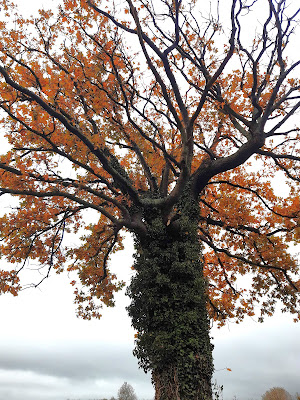Then I got Covid and didn't go anywhere for ten days - literally, in fact, as my partner omitted to catch it at the same time and, since he's self-employed, was keen not to miss work. So I sat in the bedroom for most of that time, with only a walk-deprived collie for company.
While we were in seclusion, there was some wild weather, including storm Ciaran, so when we finally rejoined the world, it was a wetter one.
And since the rain has continued, Cwtch and I have spent some time exploring The Small Dark Wood of the Mind, which affords some shelter.
The Small Dark Wood of the Mind is a feral, largely untended wood
that wasn’t where it is now in the 19th century. Along with the Field of the
Hollowing Oak and Rooky Wood to its east, it’s part of the edgelands sandwiched
between the golf course, a housing estate, Charlton Road and the Airbus campus. The trees in the above photo grow on top of a bank or dyke alongside the footpath, which clearly isn’t a natural feature of the landscape and also doesn’t feature
on the Victorian map.
There’s another similar bank, also marking the boundary
of the campus, where the rookery grows. You can see it in the recent video I took of a muntjac running up and down the wood.
I’ve been trying to work out why and when these earthworks were undertaken. I wonder if, because the factories have been used to build aeroplanes (or parts) and weapons for decades, they were put up during the war to make it harder to infiltrate the hangars and workshops. (Presumably the footpath would have been blocked for the duration.) I like this theory but haven’t been able to verify it online. Maybe I’m using the wrong search terms. And the people I might have asked who worked there - my father, my godfather, poet John Terry - are all dead, although someone on Facebook did suggest they might be bunds, designed as blast protection walls, also during the war.
I’ve been trying to work out why and when these earthworks were undertaken. I wonder if, because the factories have been used to build aeroplanes (or parts) and weapons for decades, they were put up during the war to make it harder to infiltrate the hangars and workshops. (Presumably the footpath would have been blocked for the duration.) I like this theory but haven’t been able to verify it online. Maybe I’m using the wrong search terms. And the people I might have asked who worked there - my father, my godfather, poet John Terry - are all dead, although someone on Facebook did suggest they might be bunds, designed as blast protection walls, also during the war.
Haws barring the way to the Grove of the Silver Chair (and Ruby Crown)
Rubbish adopting an effective camouflage
Cwtch in the clearing where so many trees were felled about a year ago
Even though there’s a fence with razor wire and keep out notices running through the part of wood on the factory side of the footpath, paths running through it are still routinely blocked with branches at the junction with the footpath, presumably to deter German spies still. Doesn’t stop Cwtch and me having a nosey about every now and then, though I’m mostly interested in fungi and feathers, and she squirrels.
Of fungi, there are a few, most of them brown. I'm not skilled at identifying them, but might hazard, clockwise from top left, inkcaps x 2, milkcap maybe, candlesnuff fungus, waxcaps x 4, potato earthballs.
As for feathers, the falling season is over, apart from woodpigeon feathers. There are always woodpigeon feathers, and no sooner have disparaged them, than the God of Fallen Feathers says hey, these are beautiful too.
As for flora and fauna, I again glimpsed the hindquarters of a muntjac scuttling into Rooky Wood (they definitely seem to have taken up residence there), while flowers have been restricted to the occasional hogweed (this one with a soldier fly) and common vetch valiantly having another go at blooming.
Far more spectacular are the colours of autumn, which did indeed advance while my back was turned.
field maples
The ash trees in the Small Dark Wood of the Mind are starting to carpet the path with yellow leaves ...
... while the oaks are stunning.
Looking towards the new Severn bridge
Of course, my most fervent admiration is for my beacon tree, the hollowing oak.






































No comments:
Post a Comment